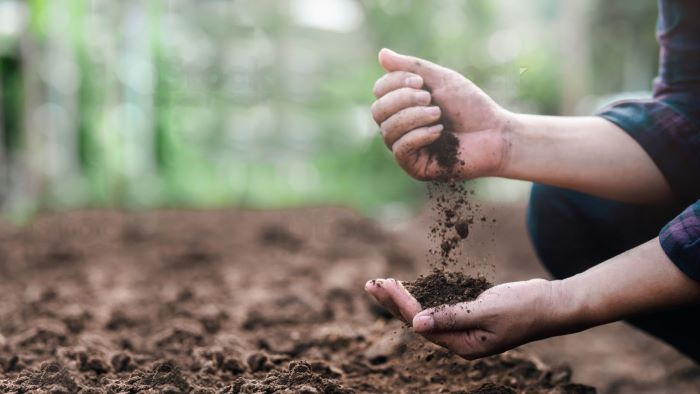Hello, and welcome to my blog on how to add nitrogen to soil. If you are a gardener, farmer, or plant lover, you probably know how important nitrogen is for the growth and health of your plants. As we know, nitrogen is a key component of proteins, DNA, and chlorophyll, and without enough nitrogen, plants may become stunted, yellow, or weak.
But how do you know if your soil has enough nitrogen? And how can you increase the nitrogen content of your soil if it is deficient? Well, don’t worry! In this blog post, I will answer these questions and more, using some reliable sources.
So, sit back, relax, and explore the world of the nitrogen cycle.🌱
Contents
- 1 Different Ways to Add Nitrogen to Your Soil
- 1.1 1. Use Synthetic Nitrogen Fertilizer
- 1.2 2. Add Manure to Your Soil
- 1.3 3. You Can Use Nitrogen-Fixing Plants
- 1.4 4. Make Compost Tea to Add Nitrogen to Soil
- 1.5 5. Apply Organic Fertilizers
- 1.6 6. Coffee Grounds Will Help You to Add Nitrogen to Soil
- 1.7 7. Use Animal Products to Add Nitrogen to Soil
- 1.8 8. You Can Use Grass Clippings
- 2 FAQs
- 3 Conclusion
Different Ways to Add Nitrogen to Your Soil
As we know, without enough nitrogen, plants will have stunted growth, yellow leaves, and poor fruit production. However, not all soils have sufficient nitrogen levels to support healthy plant growth. Fortunately, there are different ways to add nitrogen to your soil.
Here are some of the most common methods to increase the nitrogen content of your soil:
1. Use Synthetic Nitrogen Fertilizer
One of the easiest and fastest ways to add nitrogen to your soil is to use synthetic nitrogen fertilizer. Such as urea, ammonium nitrate, or ammonium sulfate. These products are readily available at most garden centers and can provide a quick boost of nitrogen to your plants.

However, synthetic fertilizers also have some drawbacks, such as leaching into groundwater, burning plant roots, and disrupting the soil ecosystem. Therefore, you should use them sparingly and follow the instructions on the label carefully.
2. Add Manure to Your Soil
The answer to your question: how to add nitrogen to your soil is to use animal manure, such as cow, horse, chicken, or rabbit manure. Furthermore, manure is a natural source of nitrogen and other nutrients, which can improve the fertility and structure of your soil.
However, not all manures are created equal. Some are more rich in nitrogen than others, and some may contain harmful pathogens or weed seeds. Therefore, you should choose manure from herbivorous animals that are healthy and well-fed.
It is recommended to compost the manure before applying it to your soil to kill any harmful organisms. As it helps to reduce the risk of burning your houseplants.
3. You Can Use Nitrogen-Fixing Plants
There is also a natural and sustainable way to add nitrogen to your soil to grow nitrogen-fixing plants. Such as legumes (beans, peas, clover), alfalfa, or buckwheat. These plants have a dependent relationship with certain bacteria that live in their roots. They help to convert atmospheric nitrogen into a form that plants can use.

So, by growing these plants in your home garden, you can enrich your soil with nitrogen. Plus, you can either harvest the plants for consumption or leave them in the soil as green manure.
4. Make Compost Tea to Add Nitrogen to Soil
Well, compost tea is a liquid fertilizer that you can make by steeping compost in water for a few days. Moreover, it contains soluble nutrients and beneficial microorganisms, which can enhance the health and productivity of your plants.
Compost tea is especially rich in nitrogen if you use compost that contains grass clippings, coffee grounds, or animal manure.
So, to make compost tea, you need a bucket, a porous bag or cloth, water, compost, and an optional air pump.
5. Apply Organic Fertilizers
Organic fertilizers are products that are derived from natural sources and contain organic matter and nutrients for your plants. Some examples of organic fertilizers are blood meal, bone meal, fish emulsion, seaweed extract, cottonseed meal, and feather meal.
You can apply organic fertilizers according to the directions on the package. Or use them as ingredients for making your own compost or compost tea.
Read More: Beginner gardening tips; Spring cleaning tips!
6. Coffee Grounds Will Help You to Add Nitrogen to Soil
Coffee grounds are another excellent source of nitrogen that you can use to fertilize your soil. Plus, it contains about 2% nitrogen by weight and also provides other minerals such as phosphorus, potassium, magnesium, and calcium.

Additionally, it improves the drainage, aeration, and water retention of your soil. To use coffee grounds as fertilizer, you can sprinkle them directly on the soil surface or mix them with compost or mulch.
However, you should avoid using too much coffee grounds at once or applying them to acid-sensitive plants, because it can lower the pH of your soil.
7. Use Animal Products to Add Nitrogen to Soil
One of the easiest ways is to use animal products such as feathers, hair, wool, leather scraps, or eggshells can also be used to add nitrogen to your soil. These products are high in protein and contain about 10% to 15% nitrogen by weight. However, they decompose very slowly and may attract pests or rodents if not buried properly in the soil.
Therefore, you should only use small amounts of animal products as fertilizer. Preferably, mix them with compost or other organic materials.
🤔How to keep indoor plants healthy?
8. You Can Use Grass Clippings
Grass clippings are another easy and cheap way to add nitrogen to your soil. It contains about 4% nitrogen by weight and also provides organic matter and moisture to your soil. You can either leave the grass clippings on your lawn after mowing or collect them. Then use them as mulch or compost for your home garden.
However, you should avoid using grass clippings that have been treated with herbicides or pesticides, as they may harm your plants or soil. Plus, you should also avoid using thick layers of grass clippings, as they may form a mat that prevents air and water from reaching the soil.
FAQs
How to add nitrogen to soil quickly?
One of the fastest ways to add nitrogen to soil is by applying a nitrogen-rich fertilizer, such as blood meal, coffee grounds, or lawn fertilizer. These products have a high nitrogen content and are readily available to plants. You can sprinkle them on the soil surface or mix them into the top few inches of soil. However, you should be careful not to overapply them, as too much nitrogen can burn the plants or cause excessive leaf growth at the expense of flowers and fruits. You should also follow the instructions on the product label and water well after applying.
How to add nitrogen to soil naturally?
A natural way to add nitrogen to soil is by planting legumes, such as beans, peas, clover, or alfalfa. These plants have a symbiotic relationship with bacteria that live in their roots and can convert atmospheric nitrogen into a form that plants can use. This process is called nitrogen fixation and can enrich the soil with nitrogen over time. You can either grow legumes as a cover crop and till them into the soil before planting other crops, or intercrop them with other plants and leave their roots in the soil after harvesting.
Do coffee grounds have nitrogen?
Yes, coffee grounds have nitrogen, but not in a form that plants can use immediately. Coffee grounds are considered a green material in composting, which means they have a high carbon-to-nitrogen ratio and provide nitrogen for the decomposition process. As coffee grounds break down, they release nitrogen and other nutrients into the soil. However, this process can take several months, so coffee grounds are not a quick source of nitrogen for plants. If you want to use coffee grounds as a fertilizer, you should either compost them first or mix them with other materials that have more available nitrogen.
What is the best source of nitrogen for soil?
There is no definitive answer to what is the best source of nitrogen for soil, as different sources have different advantages and disadvantages. The best source of nitrogen for your soil depends on several factors, such as your soil type, your plant needs, your budget, and your environmental impact. Some common sources of nitrogen for soil are: Manure is an organic source of nitrogen that also adds organic matter and other nutrients to the soil. However, manure can also contain pathogens, weed seeds, salt, and heavy metals that can harm plants or humans if not properly composted or applied.
Conclusion
I hope you enjoyed reading this blog post on how to add nitrogen to soil. Hopefully, you learned something new and useful for your gardening or farming endeavors.
Nitrogen is a vital nutrient for plants, and it can make a huge difference in their growth and quality. By testing your soil for nitrogen levels, and applying the appropriate amount and type of nitrogen fertilizer. In this way, you can ensure that your plants get the best possible care.
Just remember to follow the instructions carefully, and avoid over-fertilizing your soil. As this can cause more harm than good. If you have any questions or comments, feel free to leave them below.
I would love to hear from you and learn from your experiences. Thank you for your time and attention, and happy gardening!

Hi, I’m Jacqueline, the editor-in-chief of cozynest. I have a passion for plants and gardening, also, have a degree in horticulture from the University of California, Davis. I love to share my knowledge and experience with our readers and help them create beautiful and healthy gardens, indoors, and outdoors. I also enjoy experimenting with different plant varieties, designs, and techniques, and learning from other experts in the field. When I’m not working on cozynest, you can find me in my own cozy nest, surrounded by my favorite plants and books.

